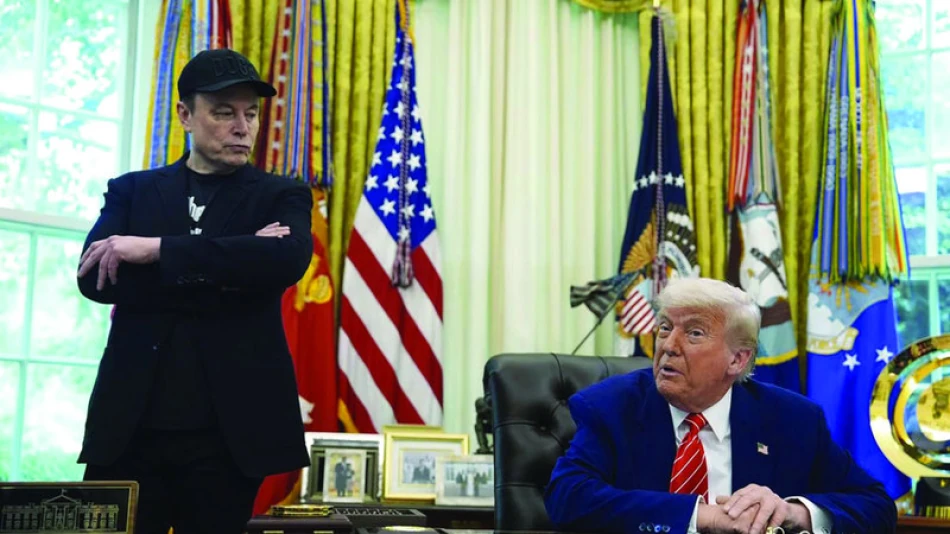
Third-Way Parties Struggle to Make Impact in America: Decades of Disappointment and Failed Attempts
Musk's Third-Party Gambit: Can Unlimited Wealth Break America's Two-Party Stranglehold?
Elon Musk has escalated his public feud with Donald Trump by announcing the formation of a new political party called "America Party," positioning it as a challenge to both Democrats and Republicans. While third-party movements have historically failed in the U.S., Musk's unprecedented wealth and proven ability to influence politics through financial power could represent the most serious threat to the two-party system in over a century.
The Rift That Sparked a Political Revolution
The billionaire's decision follows a dramatic falling-out with Trump over federal spending policies. After contributing tens of millions to Trump's 2024 campaign and joining his administration to lead the Department of Government Efficiency (DOGE), Musk found himself at odds with the president over a spending and tax bill that would add over $3 trillion to the federal deficit over the next decade—what Musk called "debt slavery."
Trump dismissed Musk's efforts, writing on Truth Social that "third parties" have never succeeded in the United States because "this system is not designed for the American people." During a Cabinet meeting, Trump suggested that a third party "might help him" rather than pose a genuine threat.
Musk's announcement came after a poll on X showed 65% of respondents encouraging him to form a new party. "When it comes to bankrupting our country due to extravagance and corruption, we will live under a one-party system, not in a democratic country," Musk wrote. "Today, America Party was formed to restore your freedom."
The Historical Graveyard of Third-Party Dreams
Lincoln's Exception Proves the Rule
Trump's skepticism has historical precedent. The Republican Party itself began as a third party in the 1850s, with Abraham Lincoln remaining the only third-party candidate to win the presidency in 1860. Since then, every attempt has failed, despite some notable efforts.
Theodore Roosevelt's Progressive "Bull Moose" Party achieved short-term success in 1912 but collapsed within two years. More recently, Texas billionaire Ross Perot won 19% of the vote in 1992 and 8% in 1996, but his Reform Party ultimately faded into irrelevance.
The Structural Barriers
The American political system creates formidable obstacles for third parties. Presidential candidates must qualify for ballots in each state individually, often requiring tens of thousands of signatures from qualified voters. The winner-take-all Electoral College system means that even significant popular vote shares translate into zero electoral votes without plurality victories in specific states.
Recent attempts have foundered on these realities. The Forward Party, announced in 2022 by former Democratic presidential candidate Andrew Yang and former Republican New Jersey Governor Christine Todd Whitman, failed to field a 2024 presidential candidate. The centrist No Labels organization, formed by Republican and Democratic lawmakers in 2010, abandoned its efforts to present a challenger in the last election.
Musk's Unprecedented Advantages
The Wealth Factor
What distinguishes Musk from previous third-party hopefuls is his extraordinary financial resources. As the world's richest person, he has already demonstrated the ability to influence politics through strategic spending. His support proved crucial to Trump's 2024 victory, establishing him as a legitimate kingmaker in American politics.
Princeton University history and public affairs professor Julian Zelizer notes that "no one has ever had this amount of money and been willing to spend so much of it to achieve his goal." This financial firepower could theoretically overcome the ballot access barriers and advertising costs that have historically doomed third-party movements.
Strategic Approach
Musk appears to understand the limitations of presidential campaigns, suggesting he might begin with local and sub-national elections where third parties have historically found more success. He referenced the ancient Greek general Epaminondas's strategy at the Battle of Leuctra, writing about using "highly concentrated force at a specific location on the battlefield" to break established power structures.
While Musk cannot run for president himself due to his foreign birth, his role as a political kingmaker could prove more influential than direct candidacy. His ability to fund and promote candidates at multiple levels of government represents a new model for third-party influence.
Market Implications and Political Timing
The current political polarization in America may create the most favorable environment for a third-party challenge in generations. Zelizer observes that "we live in an era where parties seem more divided than we think," potentially opening space for alternatives that previous generations might have rejected.
For investors and political observers, Musk's move signals potential instability in traditional political alignments. His influence on government spending policies, cryptocurrency regulation, and technology oversight could shift dramatically depending on his political success. The business community, which has grown accustomed to navigating a predictable two-party system, may need to adapt to a more fragmented political landscape.
The Verdict: Revolution or Repetition?
Despite Musk's advantages, the structural barriers that have defeated third parties for over 150 years remain formidable. The Democratic and Republican parties possess extensive experience, established fundraising networks, and the flexibility to absorb popular ideas from potential competitors.
However, Musk's combination of unlimited resources, proven political influence, and strategic thinking represents the most serious challenge to the two-party system since the Republican Party's emergence in the 1850s. Whether he can overcome historical precedent may depend less on his wealth than on his ability to build sustainable political institutions beyond his personal influence.
The ultimate test will be whether American voters, increasingly dissatisfied with their political options, are ready to abandon the familiar two-party framework for an untested alternative backed by the world's richest entrepreneur.
Most Viewed News

 Sara Khaled
Sara Khaled






